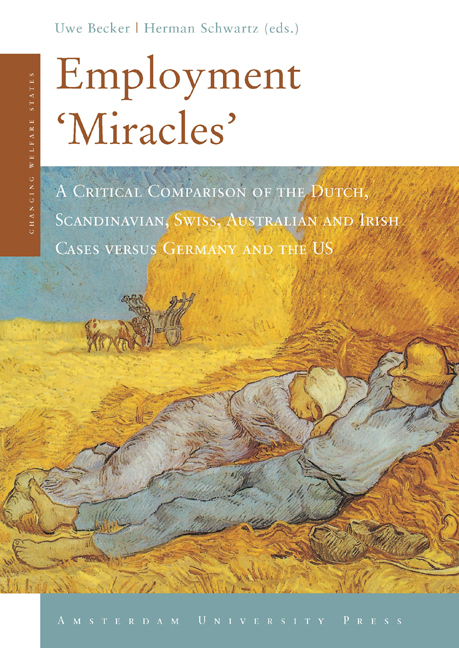 Employment 'Miracles'
Employment 'Miracles' Book contents
- Forntmatter
- Contents
- Preface
- 1 Introduction: Miracles, Mirages and Markets
- 2 The Dutch Model: Magic in a Flat Landscape?
- 3 Employment and Unemployment in Denmark and Sweden: Success or Failure for the Universal Welfare Model?
- 4 The Evolution of the Finnish Model in the 1990s: From Depression to High-Tech Boom
- 5 The Swiss Miracle: Low growth and high employment
- 6 Recasting the Story of Ireland’s Miracle: Policy, Politics or Profit?
- 7 The Australian Miracle: Luck, Pluck or Being Stuck Down Under?
- 8 Last Year’s Model? Reflections on the American Model of Employment Growth
- 9 The German Contrast. On Bad Comparisons, Special Circumstances, Luck and Policies That Turned Out to Be Wrong
- 10 Conclusion: The Importance of Lucky Circumstances, and Still the Liberal-Social Democratic Divide
- Bibliography
- Contributors
- Index
Preface
Published online by Cambridge University Press: 15 January 2021
- Forntmatter
- Contents
- Preface
- 1 Introduction: Miracles, Mirages and Markets
- 2 The Dutch Model: Magic in a Flat Landscape?
- 3 Employment and Unemployment in Denmark and Sweden: Success or Failure for the Universal Welfare Model?
- 4 The Evolution of the Finnish Model in the 1990s: From Depression to High-Tech Boom
- 5 The Swiss Miracle: Low growth and high employment
- 6 Recasting the Story of Ireland’s Miracle: Policy, Politics or Profit?
- 7 The Australian Miracle: Luck, Pluck or Being Stuck Down Under?
- 8 Last Year’s Model? Reflections on the American Model of Employment Growth
- 9 The German Contrast. On Bad Comparisons, Special Circumstances, Luck and Policies That Turned Out to Be Wrong
- 10 Conclusion: The Importance of Lucky Circumstances, and Still the Liberal-Social Democratic Divide
- Bibliography
- Contributors
- Index
Summary
The very positive economic and particularly employment development that took place in the decade up to 2001 (or even longer) in Denmark, Ireland, the Netherlands, Australia and, since the second half of the 1990s, Finland and Sweden has been at the centre of much recent discussion in comparative political economy. Because this development contrasts markedly with near stagnation in France, Germany and Italy, it has been characterised in terms of ‘miracles’ and ‘models’. The Netherlands and Denmark attracted the most attention because their strong employment growth and employment stabilisation at very high levels, respectively, occurred in the framework of welfare systems that are still comparatively generous and that clearly differ from the USA and the uk. In the latter two countries, high employment and low unemployment went together with levels of inequality and poverty not (yet?) acceptable in the northwest of the European continent. It is no surprise, therefore, that politicians, journalists and scientists in other countries where employment has stagnated or even declined started discussing whether they could learn something from Denmark and the Netherlands.
To a large degree, the tenor of this discussion exalted the miracle economies, focussing on successful wage restraint agreements between capital and labour that was hidden under labels like new social pacts and competitive corporatism. Critical accounts were relatively rare. This situation is the context for our book, which critically scrutinises the dominant view by asking whether these small countries can figure as models for other countries. Thus, we ask how important conscious policies and agreements really have been in the miracles, and the degree to which positive developments in the small economies have been facilitated by favourable conditions and accidental, ‘lucky’ circumstances. We find that conscious policies played a much smaller role than most analyses suggest. All our countries benefited from the very smallness of their economies. They also benefited from lucky changes in their external environment, like sharply rising selective American investment (Ireland), the accelerating demand for commodities by Asian countries (Australia) and particularly the way that global disinflation triggered a wealth effect and rising private consumption through the house price increase in Australia, Denmark, Ireland and the Netherlands (much as happened in the late 1990s and the early 2000s in the USA, the uk and Sweden).
- Type
- Chapter
- Information
- Employment 'Miracles'A Critical Comparison of the Dutch, Scandinavian, Swiss, Australian and Irish Cases versus Germany and the US, pp. 9 - 10Publisher: Amsterdam University PressPrint publication year: 2005
